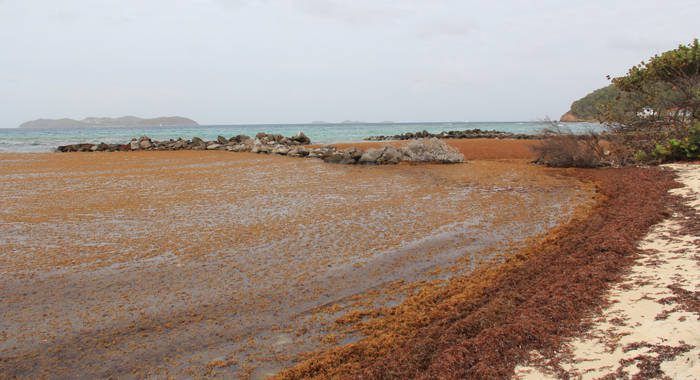The government of St. Vincent and the Grenadines has appointed a task force to deal with the problem of sargassum, floating seaweed that has accumulated on some of the nation’s beaches, emitting a pungent smell as they rot.
Prime Minister Ralph Gonsalves announced to the media on Tuesday that Cabinet has appointed Minister of State in the Ministry of Works, Sen. Julian Francis, head of the Sargassum Action Task Force
“We are doing some cleaning up but we have to find a comprehensive [response],” Gonsalves told reporters at a press briefing.
He said discussions have also been held with Barbados, which is recruiting a scientist to help to deal with the problem.
“I’ve a report on the site visit by the Sargassum Action Task Force,” he said, adding that the report speaks to the issue in each of the locations affected.
“Arising from this report, I have set up an inter-ministerial task force rather than just a technical task force to address this question,” Gonsalves said.
He said he has also had talks with the University of the West Indies.
“I am disappointed that the University of the West Indies hasn’t been able to tell us anything about this matter,” Gonsalves said.
He said that in Union Island, the government, through the Tobago Cays Marine Park Board, plus business people are working to clean up.
“But as soon as you clean, of course, it comes again. And we are having this thing done,” he said.
Sargassum originates in the Sargasso Sea in the Atlantic Ocean around Bermuda.
The United States National Oceanic and Atmospheric Administration (NOAA) says
Sargassum is abundant in the ocean and the floating rafts of sargassum can stretch for miles across the ocean.
This floating habitat provides food, refuge, and breeding grounds for an array of critters such as fishes, sea turtles, marine birds, crabs, shrimp, and more.
Sargassum serves as a primary nursery area for a variety of commercially important fishes such as mahi mahi, jacks, and amberjacks, NOAA says.
When Sargassum loses its buoyancy, it sinks to the seafloor, providing energy in the form of carbon to fishes and invertebrates in the deep sea.
Sargassum may also provide an important addition to the food sources available in the deep sea.







Leave nature alone, PM!
You have destroyed our environment enough over the past 14 years.
They should probably find a way to compost all this stuff and use it as natural fertilizer
You would have to use to waste too much fresh water to wash out the salt. Better to let nature run its course.